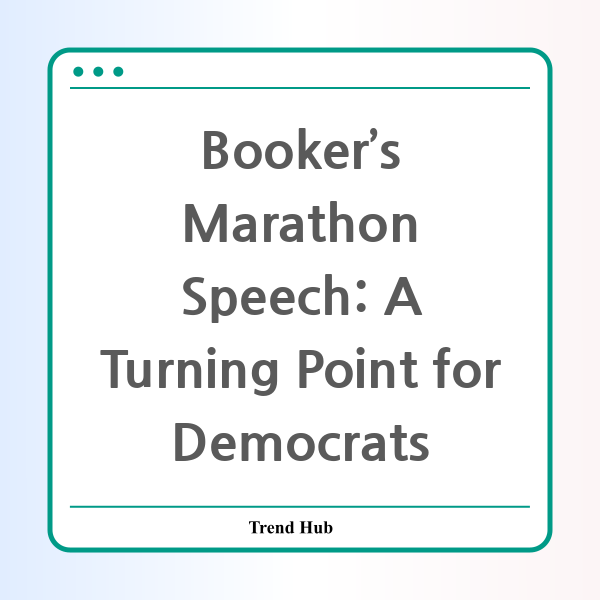* This website participates in the Amazon Affiliate Program and earns from qualifying purchases.

In an era marked by polarizing political discourse, the recent 25-hour-long speech delivered by Senator Cory Booker (D-N.J.) on the Senate floor stands as both a remarkable feat of endurance and a significant moment for the Democratic Party during the new Trump era. Following years of challenges and setbacks, particularly in the wake of losing the White House, Senate, and House, Booker's impassioned address may signal a resurgence of energy and unity among Democrats.
Booker’s speech, which set a new record for the longest Senate address, was not merely a display of stamina but a strategic maneuver designed to rally the base and bring attention to urgent issues facing the nation. Describing his motivation, Booker emphasized having heard urgent pleas from citizens across the country for lawmakers to step up their efforts in the face of a political crisis. This sentiment resonates particularly today, as many feel increasingly marginalized and frustrated with the status quo.
Throughout his address, Booker provided a scathing critique of the Trump administration's policies, particularly their implications for federal agencies and key social programs. He highlighted the severe impacts that these policies have had on vulnerable populations, effectively channeling the heart of Democratic ideology which seeks to uplift and support those in need. By invoking the spirit of the late civil rights leader John Lewis, Booker reminded both his colleagues and viewers of the profound moral responsibility that lawmakers carry—to engage in "good trouble" for the sake of justice and equality.
The timing of Booker’s speech could not have been more strategic. It came against a backdrop of growing disarray within the Republican Party, where internal conflicts have begun to surface, notably highlighted by House Speaker's struggles to maintain cohesion among his caucus. This disarray has been compounded by recent elections in which Democratic candidates have achieved significant victories, indicating a shift in voter sentiment.
In particular, the recent state Supreme Court race in Wisconsin, where a Democratic-backed candidate defeated a GOP rival, serves as a poignant indicator of the potential for Democratic resurgence. Such victories provide hope and a blueprint for future electoral success, especially as the GOP faces challenges in maintaining its base without Trump on the ballot in upcoming elections.
As we look ahead, several crucial questions arise. For instance, can Democrats capitalize on this newfound momentum and unify their ranks in the face of ongoing challenges? Will they be able to effectively translate public dissatisfaction with the GOP into actionable support during the next election cycle? Moreover, as issues such as anti-wealth sentiment and the influence of figures like Elon Musk loom large in public discourse, how will both parties adapt their strategies to navigate these complexities?
Ultimately, Booker's marathon speech serves as both a rallying cry and a litmus test for Democratic unity and resolve in the face of future battles. As the party seeks to reclaim its footing and engage with a disenchanted electorate, leaders must draw inspiration from Booker’s call to action: to get into "good trouble" for the sake of redeeming the soul of the nation. With solidarity, strategic messaging, and a commitment to addressing the pressing issues of our time, the Democratic Party may just find the pathway back to prominence it so desperately seeks.
* This website participates in the Amazon Affiliate Program and earns from qualifying purchases.